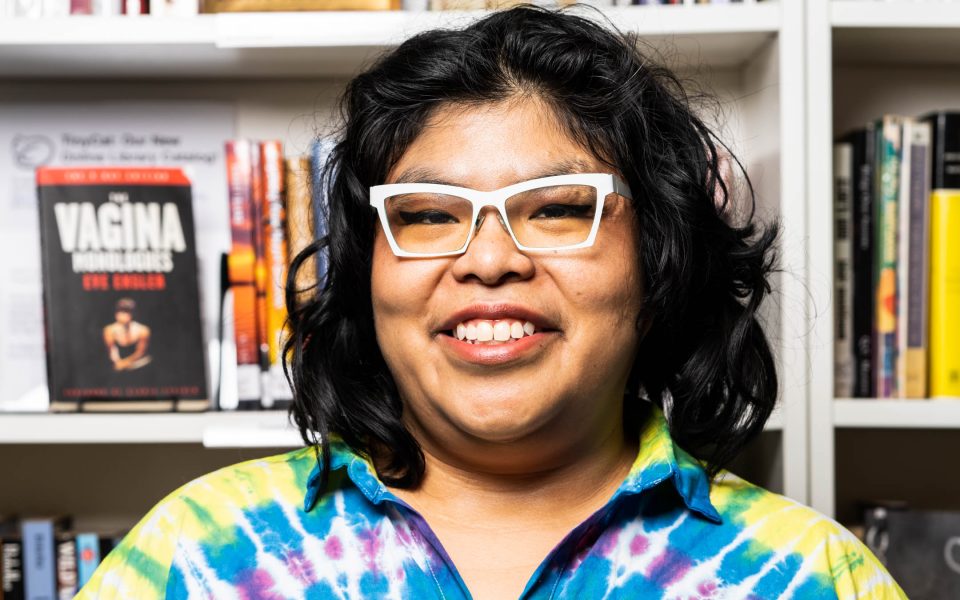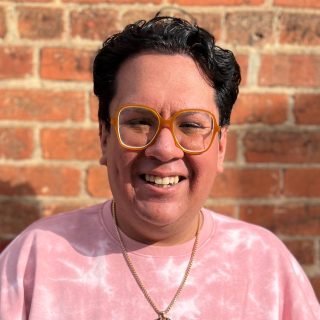The North Star LGBTQ+ Community Center opened in 2013 in Winston-Salem. Last month, they celebrated their grand reopening just in time for their 10th anniversary. The center is now located on Burke Street and services the LGBTQIA2S+ community of Winston-Salem and the surrounding areas. Cindia Gonzalez has been the chair of the board since 2021 overseeing the operations and strategic direction of the organization. Gonzalez spoke to Triad City Beat to talk about the legacy of North Star, how it got its name and why the space is important in this moment. Learn more at northstarwsnc.org.
This interview has been edited for length and clarity.
To get us started, can you take us through a brief history of the North Star LGBTQ Center?
Teresa Carter was the founding member of North Star LGBTQ community center back in 2013. She felt like there was a significant need for a physical space that people could actually meet in, have community and be comfortable. We were originally on Brookstown [Avenue]; it was a very big house. But unfortunately, we weren’t able to maintain that. So we moved to our address on Burke Street and we have been there probably for seven years. Now, with the center and with the board that we have now, we just really want to emphasize the physical space. Our goal as a board is bringing North Star back as a community center where people can meet and hang out.
North Star is volunteer run with a board of directors. Can you talk about how that impacts the work? Is there hope in the future to hire full-time paid staff?
Everyone who helps out with North Star is essentially a volunteer. Even the board of directors are volunteers. It’s all done out of love at this point. We have a lot of strong board members who really want to invest into the community in Winston-Salem.
Our volunteers help us with keeping the center open and helping us with events. We do hope to hire a staff person and are going to be hiring a part-time administrative assistant. Without grant funding we are not gonna be able to hire a full-time person. Our next goal as an organization is to start looking for grants to build up the organization and have full-time staff. We want to be open for more hours, because right now we’re just open on the weekends. We would really like to be open every day.
You recently celebrated the center’s 10th anniversary and reopening. What does this momentous occasion mean for North Star and how has the center changed in that time?
We had reopened the center, I believe it was March 2022. We invited everyone back into the space. Being able to use the space and get a feel for what the function was now that everything was so different post pandemic, we realized we wanted to go ahead and focus on what the community actually used the center for. It informed the renovation that we did on the center. It’s a more welcoming and friendly and comfortable setting. We hear from a lot of people that it feels like coming home. What the renovation did for us is it helped us revitalize this space. We took care of all these repairs and gave the center a new life for people to come and enjoy it.
Tell me what North Star hopes to accomplish in the next year.
The goal for this year and last year and every year is to let people know about North Star. It’s an organization that has existed in Winston for 10 years. I still have so many people who are like, ‘I had no idea we had this here. I didn’t even know that we had an LGBTQ community center.’ Also, we want to work on getting that funding so that we can support the community even more.
With North Carolina anti-LGBTQIA2S+ laws being considered and passed, how has the current political reality shaped the work of the center?
It has made it crucial that we have a space like this in Winston. Historically North Star has been a place where we have always had a lot of youth programming. Unfortunately, we lost that connection during the pandemic. Everybody from our youth program grew up and went to college, which is great. You know, that’s what we want. Sometimes the youth don’t have the support at home, at school or their friend group.
Even before all of these laws life could be very dangerous for children in this area and especially the surrounding rural areas. I think now with these laws it’s perilous almost. We don’t have as many young people coming into the center. We think that maybe it has to do with the restrictions; I think parents are feeling a lot more cautious. But, you know, we want to provide that safe space. There’s so many people who realize they have this queer identity and especially in the South that have never met someone else who shares that identity. You start to feel isolated, you start to feel like maybe you’re the only one. Teenagers especially feel that loneliness. There is a high rate of suicide and mental illness. We want to help with that. Sometimes just coming in here and being able to have a conversation with someone who identifies the same way as you can just change your entire perspective.
The word North Star conjures images of a beacon or lighting the way. How did North Star get its name?
North Star is actually the name of a Marvel superhero. The founders were inspired by North Star, Marvel superhero who’s the first queer superhero or one of the first queer superheroes. A lot of people don’t know that we actually got our name from that.
Is there anything else you want to add?
The other thing I wanted to add was in 20 years we also hope to work with LGBTQ youth experiencing homelessness. It’s still something that happens all the time. They get kicked out of their homes or they end up experiencing homelessness. Right now our hands are tied, we do not have resources for children or adults who are experiencing that.
There’s just so many issues affecting the queer community. It feels like there’s so many things that we could help with.The homelessness thing is a very long-term goal. We’re not there yet, but I think that we could definitely get to that place.
Join the First Amendment Society, a membership that goes directly to funding TCB‘s newsroom.
We believe that reporting can save the world.
The TCB First Amendment Society recognizes the vital role of a free, unfettered press with a bundling of local experiences designed to build community, and unique engagements with our newsroom that will help you understand, and shape, local journalism’s critical role in uplifting the people in our cities.
All revenue goes directly into the newsroom as reporters’ salaries and freelance commissions.


Leave a Reply